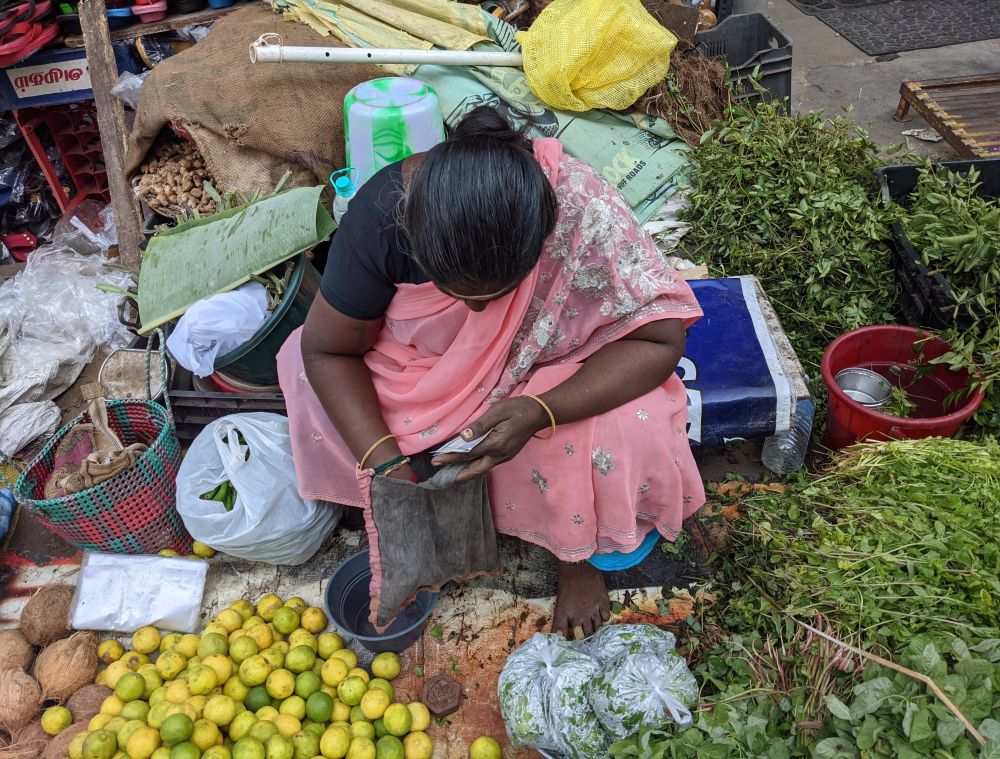Are Indian Women home-making or home-running? Let’s figure out.
Highway Fruit Seller, Maharashtra
Somewhere between Satpura National Park and Goa, the highway is fringed by women sitting on the pavement amidst baskets of fruits. It is a yellow afternoon. As my partner and I drive by, the vendors wave and call while wiping the rainbow of fruits with a cloth. Plump round guavas, large custard apples, sparkling oranges, red apples, pointy jujube, tight sapodillas, big pineapples—they have them all. Because they call, we don’t stop. But near a woman who is quietly wiping the pomegranates, I ask my partner to stop the car.
“We could buy some,” I say.
He nods. “Sure.” What do you think we should get, is his question next.
“Let me see.” I get down. He gets down too.
The woman smiles and welcomes us. It must be about one or two pm. The sun glowers down hard on us. Not a shade, not a tree, not even an umbrella to protect herself. The fruit vendor is sitting on the ground.
Amongst everything, my eyes go to the shining red pomegranate.
“How much?” I ask. Price is high but not as high as the city.
I say, “Two kilos.”
The woman forwards the basket toward me and asks me to pick. I sit down on my haunches and start putting the clean big red pomegranates into the basket. Each of them is sparkling like a king. The vendor insists even the spotted ones are good. But in my experience, spotted pomegranates are difficult. They have some crumbling, blackening substance behind the spot which soon rots the whole fruit if it is not cut on time. I do have a lot of experience with fruits, including picking pomegranates and apples myself in Himachal villages.
Back and forth, the hawker and I, smiling in between, fill the basket with two kilos.
She wants me to try other fruits too but I tell her I already have custard apples and oranges. So I can’t take those. She still gives us a taste of a guava. It is good, but honestly, with a whole basket of ripening-every-second custard apples and two baskets of oranges—both of which we had bought on the highway—I just can’t buy any more fruits.
After putting the two kilos in a pack, she throws in two small pomegranates too.
“Just along with the big ones I’m giving you these.” She smiles.
So the vendor knows not only marketing but she knows how to be nice too.
I don’t ask her name. Probably I should.
Because we had been in the car in the air conditioning, the raw afternoon heat scorches our skin and head even more harshly.
“You don’t even have an umbrella or anything.” I tell the seller. “How do you get all this here?” I am curious.
“I drive gaadi.” She says and, seeing me squinting and struggling to find a vehicle (I didn’t know what to look for), points in a direction to my left. A motorbike is parked at a bit of a distance. It has more stuff around it.
“So, first, I go buy in the morning, and then I bring all this here.” She beams the smile of those who have no choice.
“Oh wow!” In my mind are thousands of Indian travellers, Instagrammers, and TikTokkers who capture every moment of their assumed bravery on camera. If one of them rides a bike, it surely becomes a post, in fact, multiple posts in varying poses. I imagine the vendor riding the bike in her sari with bags of fruits bulging from its both sides. In my mind, she is squeezing through the traffic, around the potholes, and past the honking cars.
“And your lunch?”
“I bring here. It will be late by the time I go back. I have to feed and educate my daughters and family. I would even have to cook dinner. My daughter can’t do it all. She has to study too.” She says, now with a modest smile that is of a human sharing her life with another human, no threads attached.
I can only listen and applaud her. I say something along the lines of you work a lot, whole day long. She asks us to come again. Then we pick up our fruit, wave her goodbye, and leave.
**
As I now sit on my chair in a comfortable hotel in Bangalore and write, while this cold threatens to render me bedridden, while the thoughts of a recent argument with my partner cloud my mind, I think of that woman still sitting on the dusty, hot highway selling fruit to run her family. And I am encouraged to continue to write, wipe my nose, push aside all thoughts, and do and become what I am meant to be.
I wasn’t with that woman for more than ten minutes and would probably never meet her again. I don’t even know her name. As I paid in cash, I don’t have any transaction history. But I doubt I will ever forget her.
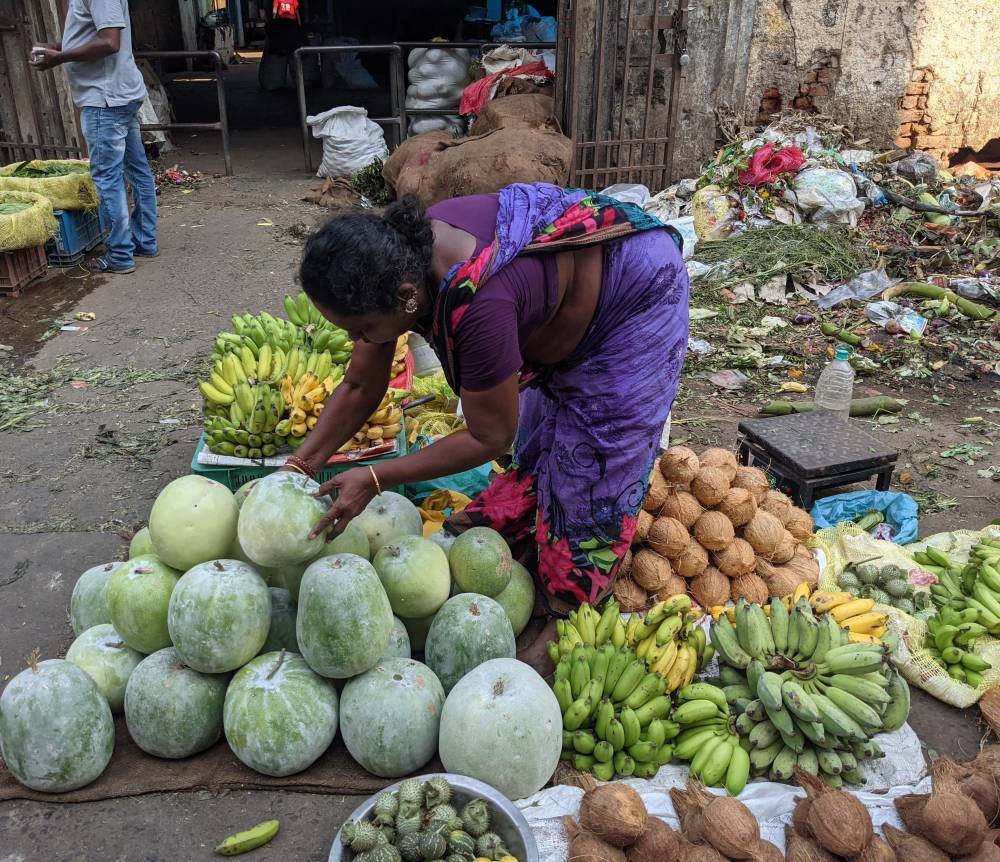
Coconut Water Woman, Roadside in Goa
We are driving from Goa to Bangalore. Goa has been a month’s sojourn, and Bangalore is a friend’s wedding destination.
I have been on the wheel since we left our apartment near Ashwem Beach. Towards the outskirts of Goa, in an area whose name I am now forgetting, are stalls on our left, each at some distance from the other.
On one of the stalls, I stop the car.
“Want to have some coconut water?” I ask my partner.
“Sure,” he says.
After a bit of drama over parking—my partner wanted us to get closer to the stand, I wanted to keep it at a distance—we get out and walk back towards the stall. The vendor in sari welcomes us with a smile. Large green coconuts are kept every which way on her stand; some hang from above. It is still as humid as it was near the beach.
We ask for two coconuts. She immediately picks one and starts chopping off its head with the big sickle she carries nonchalantly. Sipping my sweet coconut, I ask about the root vegetables kept on the stand. Smiling, she says, “Goan people really like those roots and consider them good to eat.” Her Hindi has a hint of a struggle since Goans speak either Konkani or Marathi. I imagine she learned the Hindi she knows while working on the highway.
“So you put them with some Kokum and salt, like you do with fish.” She is explaining marination without using the word.
“And then you fry them. It’s really good,” she continues. The vendor is hoping for us to buy but I don’t tell her that where I am heading, I wouldn’t have a kitchen for a bit.
At the slightest hint of my smile, she smiles. Something makes her tell us that the woman at the nearby stall takes her most customers these days. We all look ahead in the direction of the next stand about thirty feet away from us.
“If a car stops, she calls it. So off they go. She is out and about walking outside on the pavement and so on. I stay here. I don’t say anything to her na so she does all this,” the vendor says. I look at the other woman’s stall from a distance. It appears more filled. Perhaps there are bananas too.
“Aunty, you do something she doesn’t do. Do something different. You are local you must know many things. Like keep banana and pineapple and other things,” I say with a gleam of hope in my eyes.
“You are right. You are right,” She says, nodding her head.
“Like let her do whatever she wants. You do something different that no one does, and people will come to you.” I over-explain, as always.
“Yeah I can keep bananas,” she says thoughtfully. “I do peel and give pineapples.” She is still thinking something while looking at us and her stall. “You know, I also have to get all this stuff in the morning. My husband doesn’t understand anything. He doesn’t know what to buy. Once, be brought papayas. All of them had these black spots and all were bad.” The stall owner shakes her head in disbelief, but she is still smiling and her eyes are a bit mischievous now. Perhaps her mind is suddenly filled with the thoughts of her home, her husband, and the world they have created together.
“Everywhere it’s the same, Aunty.” I laugh and pull my partner’s cheeks. I go on to tell her that he doesn’t know how to get anything either.
We all giggle. My partner doesn’t protest even though now he gets decent fruits and vegetables at least half of the time.
Turning her attention to us, she asks, “And where are you guys from?”
With curiosity in her eyes, as if she really wants to know more about this couple who is giving her business advice.
“Bangalore.” My partner says before I can reply. He gives the easiest answers. Bangalore or Mumbai is his go-to standard. I try to explain to people that we do not live in one place. We have no home base. I am from UP, and he is from Mumbai. That we lived in Bangalore once, but not any more. But not he. One-word answer. And because it would be hard to explain our long nomadic story to a woman who might not have lived outside Goa—probably not travelled more than a few hundred kilometres beyond her home—I also stay quiet. Bangalore it is.
Cars pass us. Some stop on the stand further ahead and some before us. Most number plates are from Karnataka.
A car drives in and pauses outside her stall. We all turn around. There’s a couple inside. The man in the driver’s seat asks the vendor something. Before we can even say goodbye, I know she has been taken in by her new customers, and our voice is already reaching her from afar. Her focus is on the new people. She has been transported.
We say goodbye, she says goodbye, and I slip into the driver’s seat again, determined to take us towards our destination.
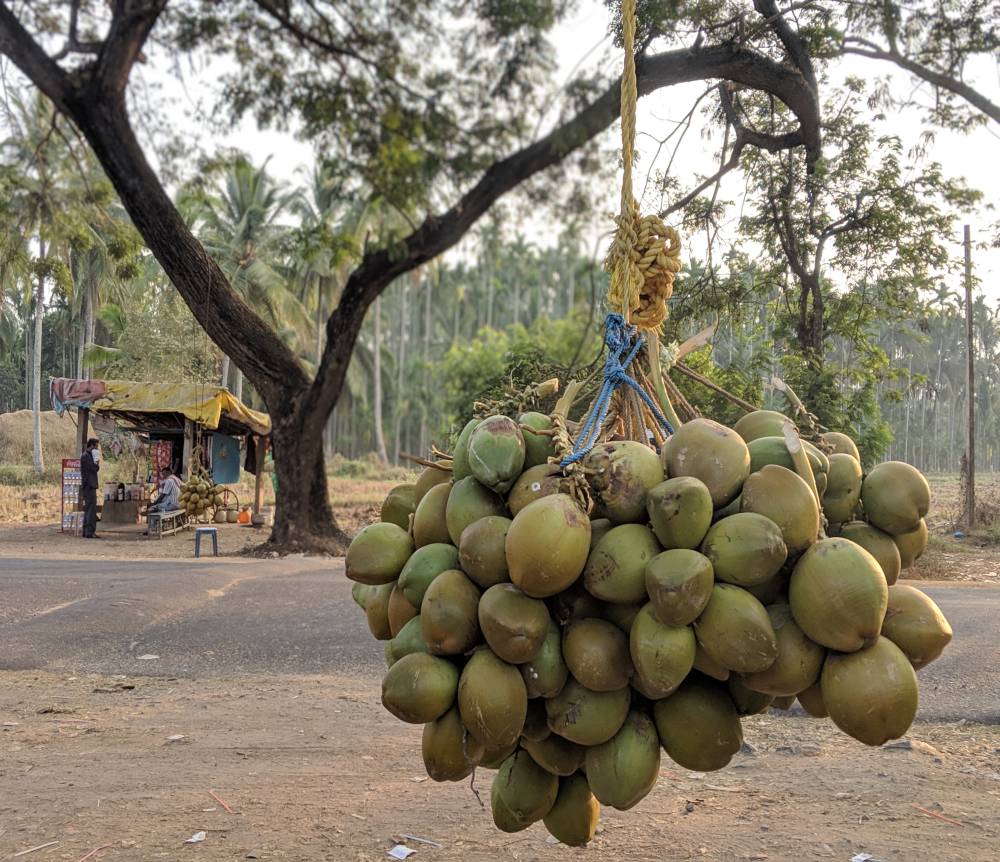
Pineapple Seller, Railway Track Crossing, Karnataka
We are still on the first day of our trip from Goa to Bangalore. Just before a railway track, I stop and ask my partner to drive. I have been on the wheel for more than four hours. I’m tired.
He protests, “Hey, just do this crossing.”
I cry, “I’m tired. How will this one crossing help?”
I get down. The railway track is closed. After a few minutes, the barriers are lifted up. Right after the crossing, as he is trying to pick up speed beyond the broken parts of the road, I ask him to stop.
A woman is selling many fruits—there’s definitely pineapple—in a kiosk on our side of the road. I get down. He stays in the car.
“Let me see what she has,” I say. He nods.
I walk to the seller. The bright but small and round pineapples make my mouth salivate. She has watermelon, ber (jujube), and custard apples, too.
“How much?” I pick up a pointy pineapple and ask her the price.
“Fifty,” She says. “These are really good.”
“Are they from your farm?”
“Yes. They are really tasty,” she emphasizes.
I believe her. Small and yellow, not golden, the pineapples look delicious. She has huge custard apples too. I pick up a few. The ones I bought from the highway in Madhya Pradesh are long over. That was a month ago.
I take two pineapples and a few custard apples. The watermelon makes me think of my partner. He loves it. The ones she has are small and would be easy to cut even in a highway hotel, where we would stay for the night. I take one.
“Thirty rupees per kilo.” She says and weighs the one I have picked. The watermelon is a bit more than three kilos. I look for another one because she seems confused with the accounting of a melon that weighs a bit more than three kilos.
“Pay hundred for this. Take.” She puts everything in a pack. “Two seventy.” She has added up.
I can’t leave yet. These pineapples are small. Let me pick up just this one more. So we would have something to eat in that wedding venue outside the city where I’m not sure if fruits would be served.
I pick up a green, not-so-ripe pineapple.
“They are really good. When you come back, tell me if they are not good.” The vendor commands. “Two seventy,” she repeats.
“You added for this pineapple?” I ask her.
“Oh. No.” She mumbles the numbers, trying to add them all. With my last-minute purchase, I have confused her.
As she holds change for my five hundred but is still calculating quietly and isn’t handing me the notes, I tell her, “Give me one-eighty. Two seventy plus fifty, three twenty. So one eighty.”
The seller, again in a sari, perspiring from the heat, hands me my change.
“Aunty keep a calculator. Else someone would make a fool of you,” I say, concerned.
“My son sells and does all this. He knows. But he has gone to play cricket. He said I want to go play cricket. What can I say?”
She passes on this information with such an expression and tone I wonder if she wants to see my reaction. Does she want to get validation from a city person who might have a different opinion than her about her son having a little hobby and leaving the shop for it?
I laugh and say, “It’s okay. Let him play.” I want to tell her to take time out for herself, too. I don’t. As I lift up the packs, she is still murmuring the numbers, unsure if I paid her well. I assure her I calculated correctly and ask her to trust me.
I walk back to the car, put the fruits on the back seat, and place the watermelon on the footrest. When I sit in the passenger seat, my partner wants to know what I bought. He is, in general, scared of my fruit shopping. He knows one day we will run out of space. Once, we did run out of space (Think: about sixty kilos of fruits and vegetables bought in Himachal to take to my parents’). I chirp to him about the juicy pineapples which I can’t wait to eat. When he starts the car, I’m relieved to not be the one driving.
I bought fruits—one of my favourite things to do on the highway—and now I want to sit, eat something, and watch the green country pass by me.
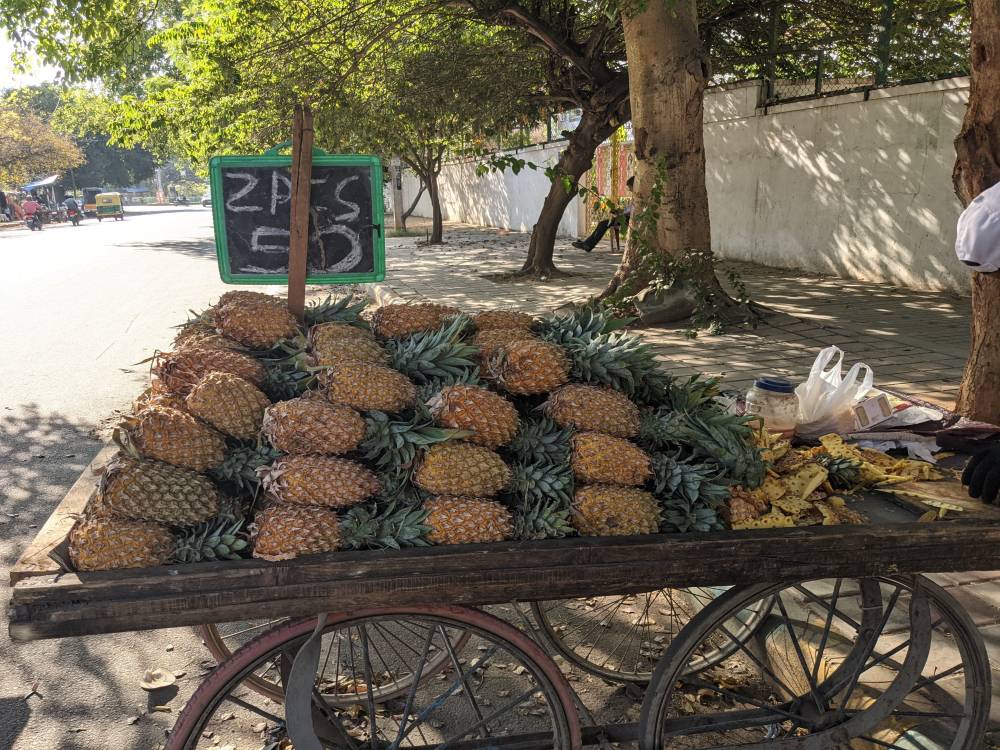
Roadside Dosa Seller, Karnataka
Yesterday, that was the pineapple day, we stayed in Dharwad town in Karnataka. Today, we leave Dharwad and drive onward towards Davanagere. Our eventual destination is Nandi Hills near Bangalore. But today, we will only make it to Tumkur city, three to four hours from Nandi Hills.
Reasons for us being slow could be many but one of the most important reasons is dosa.
You see, we haven’t been in Karnataka for three years. So now, revisiting Karnataka is a big deal for us.
We have missed the thick crispy crunchy Karnataka dosas more than anything. Not even Tamil Nadu nor Pondicherry made such dosas Karnataka does, at least, in our opinion. Some of the dosas we ate in other places had too much of spicy masala. Most dosas weren’t that crispy. And others were good and of ragi or wheat and so on but none were as crunchy and thick—as if the Karnataka dosa batter has some magic in it. Most dosas in India are paper thin. But not Karnataka dosa. Dosa here holds on to its crunchiness even after five minutes, or ten minutes. It crackles in your mouth. This dosa doesn’t break or sog or fall unless you break it.
So we are sure we would stop on the way a couple of times.
I am still tired from the previous day’s drive. Having started to drive recently, I am not used to driving long hours. My eyes burn. My partner takes command. After a bit of a drive and a breakfast stop, I ask him to stop at a series of stalls. Most of them are selling sugarcane juice and coconut. But one of them flaunts a clay pot covered with a red cloth and labelled with “Organic buttermilk.”
I want that buttermilk, and so I tell him. He wants it too.
In the bright sun, we walk to the stall to discover a lean, dark woman wrapped in a sari serving locals buttermilk from that pot. She hands a man a plate of rice. I assume it is some kind of pulao, the local rice preparation. Another man is sitting on a plastic chair behind the stall, presumably waiting. Another one drinks the buttermilk from a small pot, raising it above his head and then tilting it to let the drink drop in his mouth. My mouth craves for the taste of that buttermilk.
Soon I am sipping the cool delicious buttermilk spiced with coriander and cumin from a plastic glass. Under an iron girdle, the flame dances. I ask the seller, “Do you have dosa?” She nods. “One, please,” I reply in less than a second, and my partner’s and my eyes meet.
Meanwhile, I wipe the butter chunks stuck to the glass with my finger. “Clean it off,” I order my partner.
“What is it?” He asks.
“It’s butter. Pure butter,” I say. He smiles. I wipe the glass off as new, and then I throw it off.
Within minutes, the woman hands us a plate which has crispy dosa, green coconut chutney, and dry potato mash. My partner and I take a few bites of the dosa, oohing and aahing at its delicious taste we have so missed. We are not hungry because we breakfasted on a plate of big idli, known as thatte idli, but none of us needs to be hungry for dosa.
The vendor asks a little boy sitting next to her to eat. She gives her options like pulao and so on. He shakes his head. He doesn’t want anything. A minute later after we have asked for more masala and chutney, she hands him a plate of rice. He refuses. She insists. Eventually, she puts the plate in his hand.
The boy takes the plate someplace else to eat. We order another dosa which comes with chutney only because the potato masala is over. I am licking my fingers. The sun is roasting us alive. The little shade of the roof of the stall doesn’t help much. The sun, which is right in front of us, slants into the kiosk. It must be around two in the afternoon.
Though the village woman is working right under the sun, she is neither squinting nor trying to shade herself from it or putting her head on her forehead to be able to see properly, unlike us. Her darkened skin tells me the sun has baked her too but she doesn’t seem to mind.
When my partner goes to the sugarcane stall to fill a one-litre bottle with juice, I take another tea from her—yes her kiosk is an end-to-end solution to everything.
I have a chocolate that the manager of our guesthouse in Goa had given me for going downstairs especially to wish her on her birthday. Even though I don’t eat Dairy Milk chocolates, I couldn’t say no to her beaming face. I took it for the glee with which she presented it to me.
That chocolate has now survived some three weeks of fridge, non-fridge, car air conditioning, melting and freezing again. I’ll give it to the child. I am not sure if he is a worker or her son. Does it matter?
I sip my tea in the shade behind the car. When I go back to pay and throw the paper cup in the dustbin, I hand her the chocolate and tell her it is for the boy. The boy is not at the stall and is washing utensils or doing some other chore somewhere else.
She asks, “For the bachcha?” With a quiet smile on her face, one that shows she is happy and thankful. I nod yes. She thanks me and keeps smiling.
I push the ten rupees for the tea towards her. She refuses. I insist and keep the money on her stall and point towards the sun and say in Hindi or English that she has been working in the hard sun, and she deserves it. She just nods and doesn’t reply.
As my partner starts up the car, I look at the seller. She looks at me, her eyes filled with love and thankfulness. First, she waves and then keeps her hand on her chest as a reverent namaste. I do the same. There is a connection at that moment. To feel it, I don’t need to remember her face. I can just press my palm to my chest anytime.
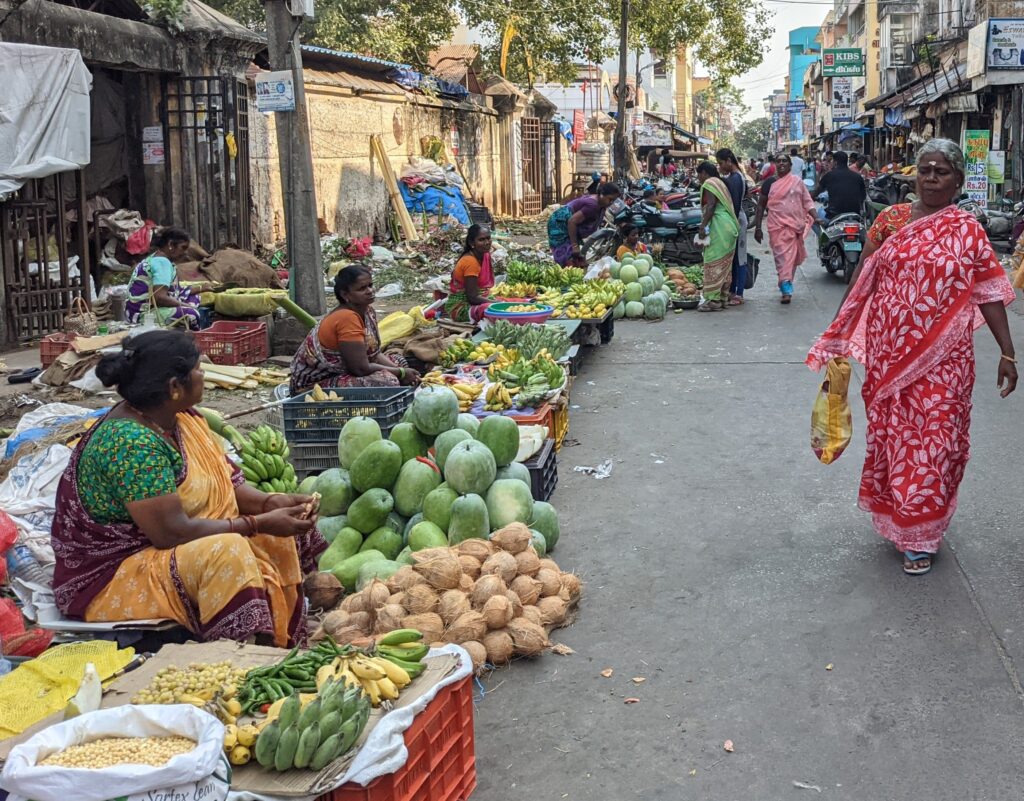
Who says that women only run homes in India? I see them running highways, food stalls, farms, families, and bikes, all in addition to homes where they cook, clean, feed, rear, educate, buy, and tolerate all of us who can’t do what we are capable of.
How is it that a middle-aged homemaking Indian woman learns to drive a bike to buy fruits from the market and take them to nowhere on the highway but a man cannot learn how to pick papayas or to make dosas?
The question baffles me.
I think it is not as much about the capability as it is about the willingness to take responsibility. If one wants, one can do anything.
Those pomegranates were some of the best I have ever had, even outdoing the hand-picked ones in Himachal villages. So either Maharashtra just has better pomegranates or somehow I was lucky to have found the best ones. Those small pineapples were also some of the juiciest and tastiest ones I have eaten in my life. So much so that cutting them in hotel rooms has been hard; the juice flowing out of these fruits goes completely out of control and runs every which way.
Ah, well.
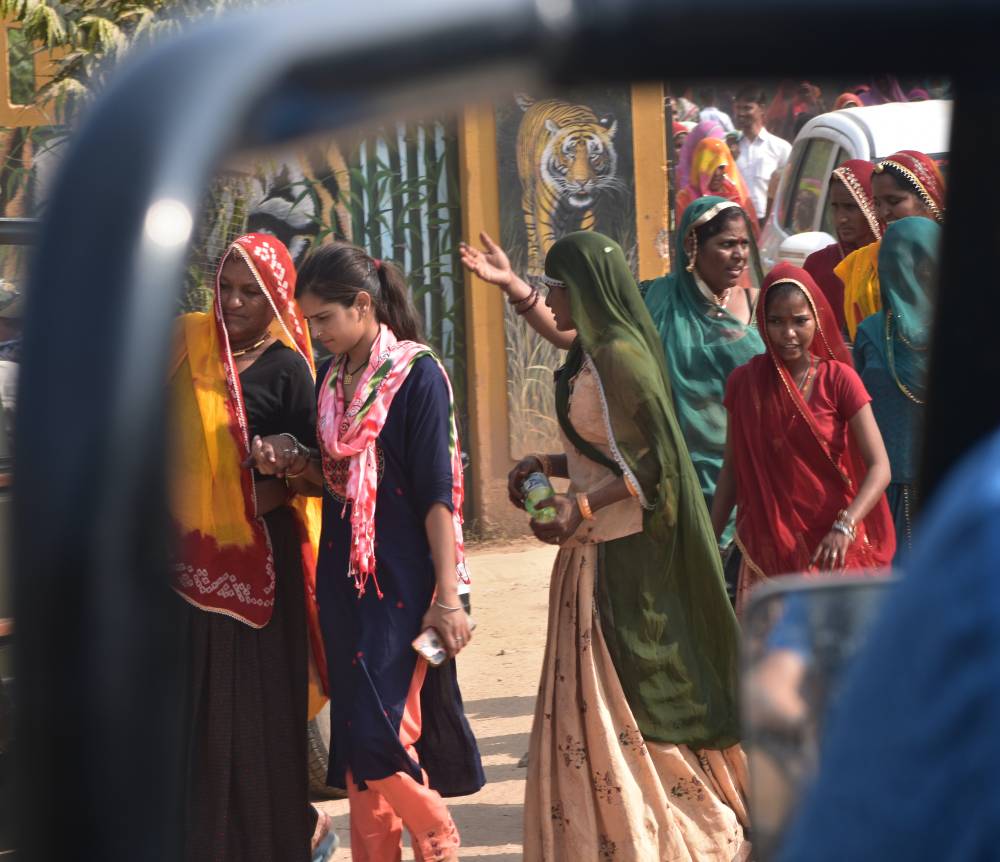
Who are some of the strong women around you?
*****
*****
Want similar inspiration and ideas in your inbox? Subscribe to my free weekly newsletter "Looking Inwards"!

